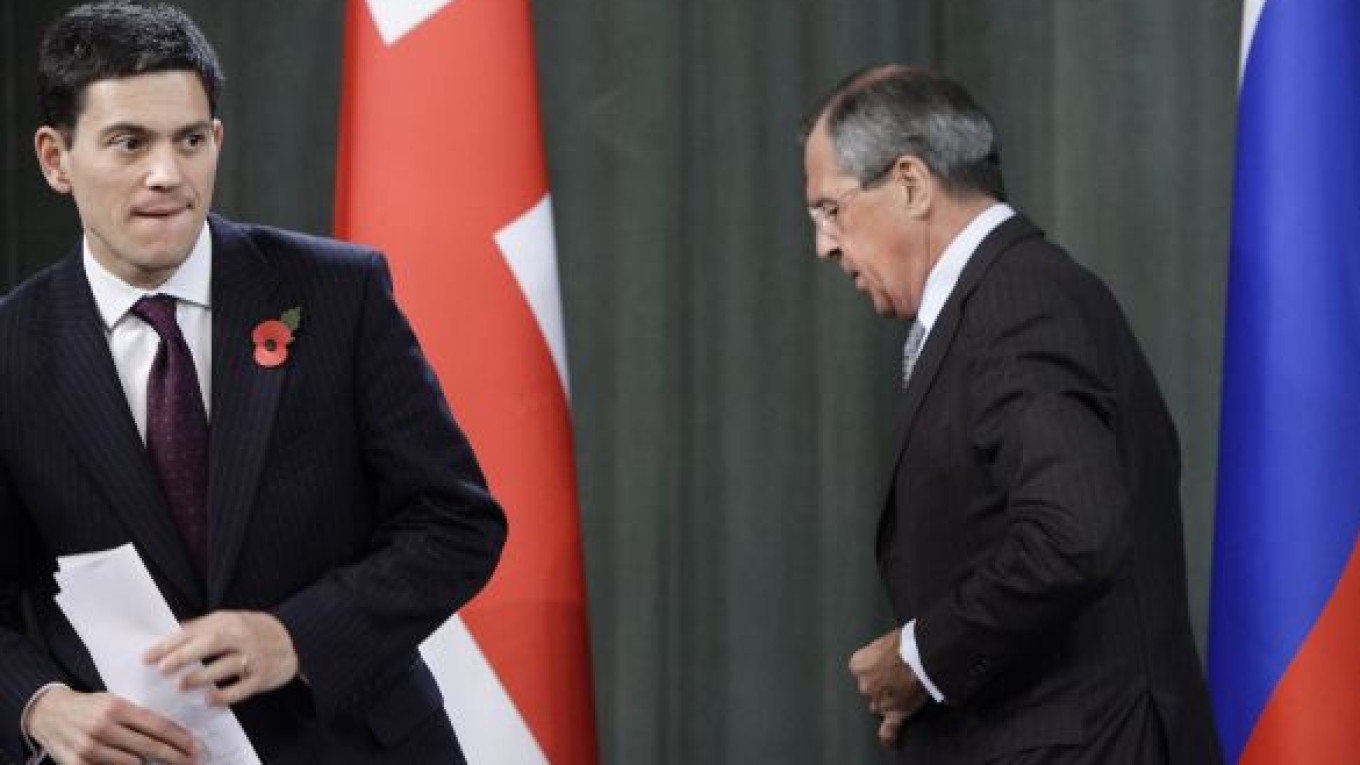Moscow and London agreed Monday on international issues like nuclear nonproliferation and Afghanistan, but neither side budged an inch on problems that have poisoned relations for the past three years.
“We agreed today on three joint declarations: on the nonproliferation of nuclear weapons, a separate declaration … on Afghanistan, and one more declaration on the problems of a settlement in the Middle East,” Foreign Minister Sergei Lavrov told reporters after meeting his British counterpart, David Miliband.
Lavrov thanked Miliband for “good, productive talks” and said he hoped that their meeting would help move the positions of the two countries closer.
He also said the duo had discussed President Dmitry Medvedev’s proposal for a new European security pact independent of countries’ membership in other military blocs like NATO.
Miliband called for a more balanced approach in relations.
“It is very important that we do not paper over our differences but we do not allow them to block our cooperation where possible,” he said at the same news conference.
But the two diplomats said they had failed to find common ground on Britain’s demand that State Duma Deputy Andrei Lugovoi be extradited to face British charges in the poisoning death of Kremlin critic Alexander Litvinenko in 2006. Russia’s refusal to extradite Lugovoi sank relations between Moscow and London to a new low. Ties had already been strained by British courts’ refusal to extradite two other Kremlin foes who had found refuge in Britain, businessman Boris Berezovsky and Chechen separatist Akhmed Zakayev.
Miliband, sporting a traditional plastic poppy on his lapel, worn by British politicians to commemorate the wartime sacrifices of British soldiers and civilians, said British officials had provided a considerable amount of evidence against Lugovoi to have him extradited.
Lavrov countered by saying the information provided by British investigators was insufficient to open a criminal investigation into Lugovoi on Russian soil. He reiterated that the Russian Constitution does not allow the extradition of Russian nationals to foreign countries.
“Prosecutors have their own criteria and rules, and British colleagues know what evidence is necessary to start the process in the Russian Federation,” Lavrov said.
Speaking on Ekho Moskvy radio later Monday, Miliband said Lugovoi should be tried in London. Litvinenko died of polonium poisoning in November 2006 after meeting with Lugovoi in London the previous month.
Lugovoi denied wrongdoing Monday, saying British officials were afraid of having him tried in Moscow because the real motives behind Litvinenko’s death would then be revealed. Lugovoi did not elaborate.
Miliband dismissed any comparison between British courts’ refusal to extradite Russians living in Britain and the Prosecutor General’s Office’s refusal to extradite Lugovoi. He argued that Moscow’s extradition requests are considered in Britain by a justice system that respects international law and is fully independent of the authorities.
Another sore point that was left unresolved Monday concerned the British Council, the cultural arm of the Foreign Office that saw two of its three Russian offices closed by Russian authorities in January 2008 and is still fighting back tax claims in the Russian courts.
Lavrov has linked the British Council’s problems to the poor diplomatic relations between the two countries. The British Council offices were closed after Miliband, angered by Russia’s refusal to extradite Lugovoi, ordered the expulsion of four Russian diplomats from Britain.
Moscow responded by expelling four British diplomats, accusing some of them of espionage, and setting the pro-Kremlin Nashi youth group loose on a harassment campaign against then-British Ambassador Anthony Brenton.
On Monday, Miliband said Lavrov had not responded to British proposals to return the work of the British Council to pre-scandal levels. The two diplomats agreed, however, to boost cultural exchanges between their countries over the next two years in an arrangement that could compensate for the opportunities lost to thousands of the Russians because of the British Council’s problems, Miliband said.
Lavrov and Miliband pledged that their governments would closely cooperate with the government of Afghanistan, were election officials declared incumbent President Hamid Karzai the winner of the country’s fraud-tarnished election Monday, canceling a planned runoff and ending a 2 1/2-month political crisis after the first round.
Miliband also urged Iran to respond quickly to a proposal by the United Nations’ International Atomic Energy Agency to send uranium to Russia for enrichment.


